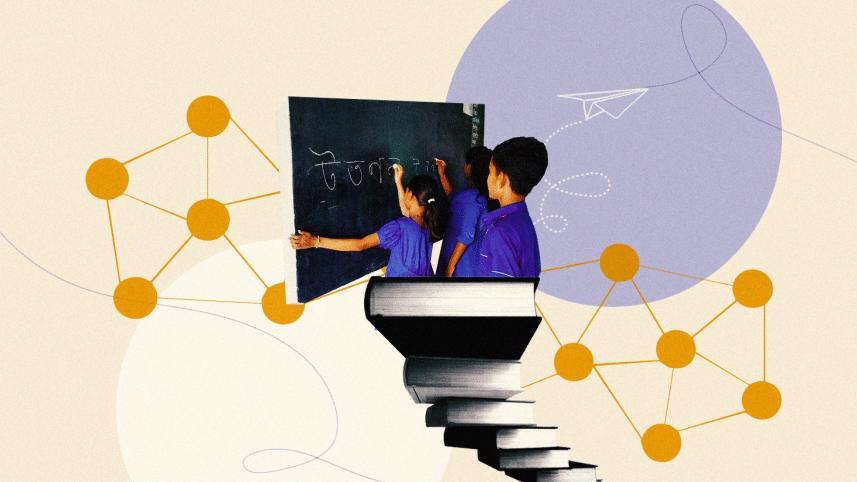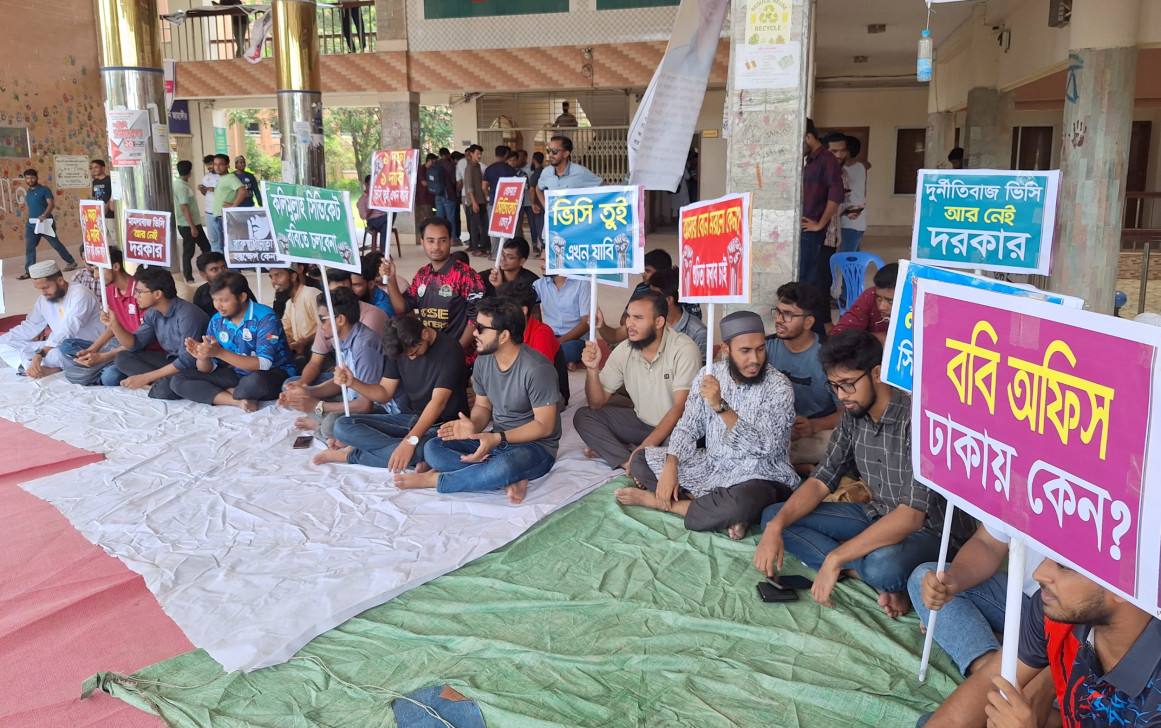Can decentralisation improve primary school outcomes in Bangladesh?

It is a matter of abiding shame and regret that the majority of our children—aged 10-14 years, including many who have completed five years of primary education—cannot read, write or count at a functional level. The World Bank's learning poverty assessment for low- and middle-income countries says so. This unhappy outcome of the primary education system is corroborated by the national student assessment reports prepared under the Directorate of Primary Education, the latest one for 2022.
This is so despite the government's and development partners' investments through a series of primary education development programmes (PEDPs) carried out over two decades. The fourth phase of PEDP is about to close and the PEDP5 will be launched in 2026. Can the fifth phase mark a new beginning so that the clock begins to move in the students' learning outcome?
Popular expectations were high about education reform when Prof Muhammad Yunus took the reign of the interim government nearly a year ago. The surge of reform initiatives of the new government did not include an education reform commission. Only a consultation committee on primary and non-formal education (PNFECC) was appointed in October 2024 by the Ministry of Primary and Mass Education with one of the authors here as the convener. The nine-member committee recommended over a hundred action points grouped under eight clusters, aimed at "overcoming the stagnation in quality." The report was handed to Prof Yunus on February 10 this year. He eagerly listened to the committee members, asked many questions, and promised serious consideration of the report and early follow-up action.
More than five months later, on July 16, after a meeting with the adviser and senior personnel of the primary education ministry, Prof Yunus, according to press reports, directed that urgent steps be taken to fill the headteachers' posts, which lie vacant in about half of the 65,000 government primary schools in the country. He also urged that teacher transfer, a sore point for many teachers, be transparent, school infrastructure be made more girl-friendly, and internet and multimedia facilities be extended to all primary schools.
One may wonder why the chief adviser's instruction was necessary regarding such basic conditions as ensuring a headteacher is available to provide leadership for good management of each school, or a school's physical facilities not become an obstacle to learning and teaching for girl students and female staff. Furthermore, why is basic instructional technology including internet connectivity not a common feature yet in primary schools?
Will the chief adviser's instruction make much difference? These problems were to be tackled under the PEDP4, which has been in operation since 2018. The consultation committee also recommended specific measures regarding school leadership and filling immediately the headteachers' and other field-level vacancies to be taken immediately. Actions regarding infrastructure and technology were also recommended. Suggestions were made about necessary actions in making each school function effectively. As it turns out, an initiative and a mechanism with a sense of urgency have been absent. Only some sporadic and uncoordinated decisions, which are in the nature of the ongoing administrative steps, have been taken.
Bureaucratic inertia, top-down decision-making with indifference to diverse field conditions, frequent indecisiveness, and a lack of proactive anticipation of problems have been characteristic in education management. How can this culture and mindset change?
Many of the problems mentioned have been identified in the earlier phases of PEDP; some steps have been taken and resources expended without satisfactory results. For instance, the Upazila Primary Education Plan (UPEP) and School Level Improvement Plan (SLIP) have been half-hearted efforts labelled as decentralised management. The former remained an academic exercise in a few locations with no follow-up through actual implementation steps and budget allocations. The latter amounted to small funds handed to schools for spending under highly restrictive central controls. A lack of conviction and commitment at the central level about devolution of authority and deep-seated mistrust of field personnel's capacity prevented meaningful decentralisation. The commitment of political and administrative decision-makers to make genuine decentralisation work has been absent.
Why and how will this change now? It must, because continuing stagnation in children's learning outcomes is not acceptable. A convergence of activities and coherence in planning and management at the local level, in schools, classrooms and communities, through decentralised management, governance and accountability supported by high-level commitment may make a difference.
Effective schools and learners through decentralised governance (ESSLD) may be the key and distinctive implementation strategy for PEDP5. In India and Pakistan, with their federal structure, there has been policy decentralisation to states and provinces, and implementation devolution to district and sub-district levels. The annual school education reports (a survey of student learning pioneered by Pratham) show that in respect of acquiring literacy and numeracy competencies by children, better results are associated with responsive and accountable management of schools. In Nepal, decentralisation of school governance has been taken since 2017 as an element of national democratic transformation. Sri Lanka, an outlier in the region with its superior performance in students' learning outcome, has decentralised school management as an essential element in reconciling ethnic, language and economic divisions.
In Bangladesh, the PNFECC report recommends that the government take a stand on decentralised governance of the basic education services. It urges that decentralisation initiatives be taken with the aim of more effective and dynamic management. The committee specifically recommends carrying out a pilot decentralisation programme within the PEDP5 as the first step towards meaningful decentralisation of primary education. The pilot is proposed for 20 upazilas; the aim would be to prepare plans, involve government and non-government providers in assessing total education needs in an upazila, secure necessary resources, and implement the plans through decentralised management (PNFECC Report, Chapter 6).
The convergence of strategic actions and efforts in an administrative area (an upazila) can overcome the obstacles of overly centralised management. A decentralised trial for creating effective schools and successful learners can be a distinctive feature of the PEDP5. For the initiative to succeed, it will require:
· High-level political commitment, support and assurance of proper technical capacity with the combination of appropriate international and national expertise through institutional collaboration for this purpose.
· Designation by the primary education ministry of a small high-level technical advisory committee, which will help guide the pilot programme's development and implementation within the PEDP5 programme framework with due consideration of risks and potentials and advise the minister-in-charge on policy-level decisions by the ministry and the government.
· Identifying and recruiting an international and national technical support team to begin necessary preparatory activities.
If the 20-upazila pilot receives government support and priority attention, by the midpoint of PEDP5, the pilot could be extended to 100 upazilas across the country, envisaging nationwide coverage in the next phase of the PEDP.
Dr Manzoor Ahmed is emeritus professor at BRAC University and has served as the convener of the Ministry of Primary and Mass Education's consultation committee on primary and non-formal education.
Dr John Richards is emeritus professor of public policy at Simon Fraser University in Vancouver, Canada.
Shahidul Islam is doctoral researcher at Queens University in Kingston, Canada.
Views expressed in this article are the authors' own.
The authors wrote the book Political Economy of Education in South Asia: Fighting Poverty, Inequality and Exclusion (University of Toronto Press, Toronto and Prothoma, Dhaka, 2022).
Follow The Daily Star Opinion on Facebook for the latest opinions, commentaries and analyses by experts and professionals. To contribute your article or letter to The Daily Star Opinion, see our guidelines for submission.




 For all latest news, follow The Daily Star's Google News channel.
For all latest news, follow The Daily Star's Google News channel. 



Comments